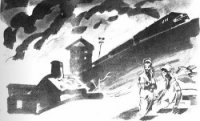A Death In The Family - Agee James (электронные книги без регистрации .TXT) 📗
Chapter 18
When grief and shock surpass endurance there occur phases of exhaustion, of anesthesia in which relatively little is left and one has the illusion of recognizing, and understanding, a good deal. Throughout these days Mary had, during these breathing spells, drawn a kind of solace from the recurrent thought: at least I am enduring it. I am aware of what has happened, I am meeting it face to face, I am living through it. There had been, even, a kind of pride, a desolate kind of pleasure, in the feeling: I am carrying a heavier weight than I could have dreamed it possible for a human being to carry, yet I am living through it. It had of course occurred to her that this happens to many people, that it is very common, and she humbled and comforted herself in this thought. She thought: this is simply what living is; I never realized before what it is. She thought: now I am more nearly a grown member of the human race; bearing children, which had seemed so much, was just so much apprenticeship. She thought that she had never before had a chance to realize the strength that human beings have, to endure; she loved and revered all those who had ever suffered, even those who had failed to endure. She thought that she had never before had a chance to realize the might, grimness and tenderness of God. She thought that now for the first time she began to know herself, and she gained extraordinary hope in this beginning of knowledge. She thought that she had grown up almost overnight. She thought that she had realized all that was in her soul to realize in the event, and when at length the time came to put on her veil, leave the bedroom she had shared with her husband, leave their home, and go down to see him for the first time since his death and to see the long day through, which would cover him out of sight for the duration of this world, she thought that she was firm and ready. She had refused to "try on" her veil; the mere thought of approving or disapproving it before a mirror was obscene; so now when she came to the mirror and drew it down across her face to go, she saw herself for the first time since her husband's death. Without either desiring to see her face, or caring how it looked, she saw that it had changed; through the deep, clear veil her gray eyes watched her gray eyes watch her through the deep, clear veil. I must have fever, she thought, startled by their brightness; and turned away. It was when she came to the door, to walk through it, to leave this room and to leave this shape of existence forever, that realization poured upon and overwhelmed her through which, in retrospect, she would one day know that all that had gone before, all that she had thought she experienced and knew-true, more or less, though it all was-was nothing to this. The realization came without shape or definability, save as it was focused in the pure physical act of leaving the room, but came with such force, such monstrous piercing weight, in all her heart and soul and mind and body but above all in the womb, where it arrived and dwelt like a cold and prodigious, spreading stone, that she groaned almost inaudibly, almost a mere silent breath, an Ohhhhhhh, and doubled deeply over, hands to her belly, and her knee joints melted.
Hannah, smaller than she, caught her, and rapped out, "Close that door!" It would be a long time before either of the women realized their resentment of the priest and their contempt for him, and their compassion, for staying in the room. Now they did not even know that he was there. Hannah helped her to the edge of the bed and sat beside her exclaiming over and over, in a heartbroken voice, "Mary, Mary, Mary, Mary. Oh Mary, Mary, Mary," resting one already translucent, spinster's hand lightly upon the back of her veiled head, and with the other, so clenching one of Mary's wrists that she left a bracelet of bruise.
Mary meanwhile rocked quietly backward and forward, and from side to side, groaning, quietly, from the depths of her body, not like a human creature but a fatally hurt animal; sounds low, almost crooned, not strident, but shapeless and orderless, the sisters, except in their quietude, to those transcendent, idiot, bellowing screams which deliver children. And as she rocked and groaned, the realization gradually lost its fullest, most impaling concentration: there took shape, from its utter darkness, like the slow emergence of the countryside into first daylight, all those separate realizations which could be resolved into images, emotions, thought, words, obligations: so that after not more than a couple of minutes, during which Hannah never ceased to say to her, "Mary, Mary," and Father Jackson, his eyes closed, prayed, she sat still for a moment, then got quietly onto her knees, was silent for not more than a moment more, made the sign of the Cross, stood up, and said, "I'm ready now."
But she swayed; Hannah said, "Rest, Mary. There's no hurry," and Father Jackson said, "Perhaps you should lie down a little while"; but she said, "No; thank you; I want to go now," and walked unsteadily to the door, and opened it, and walked through.
Father Jackson took her arm, in the top hallway. Although she tried not to, she leaned on him very heavily.
"Come, now," their mother whispered, and, taking them each by the hand, led them through the Green Room and into the living room.
There it was, against the fireplace, and there seemed to be scarcely anything else in the room except the sunny light on the floor.
It was very long and dark; smooth like a boat; with bright handles. Half the top was open. There was a strange, sweet smell, so faint that it could scarcely be realized.
Rufus had never known such stillness. Their little sounds, as they approached his father, vanished upon it like the infinitesimal whisperings of snow, falling on open water.
There was his head, his arms; suit: there he was.
Rufus had never seen him so indifferent; and the instant he saw him, he knew that he would never see him otherwise. He had his look of faint impatience, the chin strained a little upward, as if he were concealing his objection to a collar which was too tight and too formal. And in this slight urgency of the chin; in the small trendings of a frown which stayed in the skin; in the arch of the nose; and in the still, strong mouth, there was a look of pride. But most of all, there was indifference; and through this indifference which held him in every particle of his being-an indifference which would have rejected them; have sent them away, except that it was too indifferent even to care whether they went or stayed-in this self-completedness which nothing could touch, there was something else, some other feeling which he gave, which there was no identifying even by feeling, for Rufus had never experienced this feeling before; there was perfected beauty. The head, the hand, dwelt in completion, immutable, indestructible motionless. They moved upon existence quietly as stones which withdraw through water for which there is no floor.
The arm was bent. Out of the dark suit, the starched cuff, sprang the hairy wrist.
The wrist was angled; the hand was arched; none of the fingers touched each other.
The hand was so composed that it seemed at once casual and majestic. It stood exactly above the center of his body.
The fingers looked unusually clean and dry, as if they had been scrubbed with great care.
The hand looked very strong, and the veins were strong in it.
The nostrils were very dark, yet he thought he could see in one of them, something which looked like cotton.
On the lower lip, a trifle to the left of its middle, there was a small blue line which ran also a little below the lip.
At the exact point of the chin, there was another small blue mark, as straight and neat as might be drawn with a pencil, and scarcely wider.




